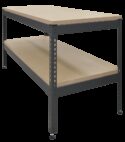Experiment
STS20

Bending Moments in a Portal Frame (Next Generation Structures)
Experiment for the study of bending moments and sway in portal frames. Mounts on the Structures platform and connects to Structures automatic data acquisition unit and software.
If you have any questions or you'd like to discuss a product, please call us.
+44 1159 722 611Bending Moments in a Portal Frame (Next Generation Structures)
One of a range of experiment modules that fit to the Structures platform (STS1, available separately), this product helps students to understand the bending moments around a portal frame due to a loads. Students add vertical or horizontal or combinational loads to a portal frame held between two fixing blocks. They may also add loads to moment arms on the vertical members (columns) of the frame. These simulate the effect of internal and external cantilever floors of a structure. Strain gauges at key points around the portal measure the strains and in turn the bending moment due to the loads.
A precision indicator measures any horizontal deflection (sway) due to the load. The positions of the strain gauges and resulting measured bending moments allow students to plot bending moment diagrams for the frame for different loading conditions, allowing comparison to calculated results.
Students use textbook analysis methods to predict the bending moments at key positions, along with the sway magnitude (if any).
This product includes a Vernier caliper for accurate measurement of cross-section.
The strain gauges connect to a strain gauge amplifier which connects (with the deflection indicator) to the USB interface hub of the Structures platform for computer display and data acquisition.
Learning outcomes
• Strain gauges as instruments
• Relationship between measured strain and bending moment
• Elastic bending of portal frames, and linear relationship between the bending moments in the frame and the load
• Use of the moment distribution (Hardy Cross) method to calculate bending moments, sway magnitude and horizontal support reactions.
• The generation and measurement of sway deflections and bending moments around the frame due to:
> Vertical loads on the beam
> Horizontal loads at the junction of the beam and uprights
> Moments applied to the uprights
> Any combination of the above
• Plotting of bending moment diagrams











